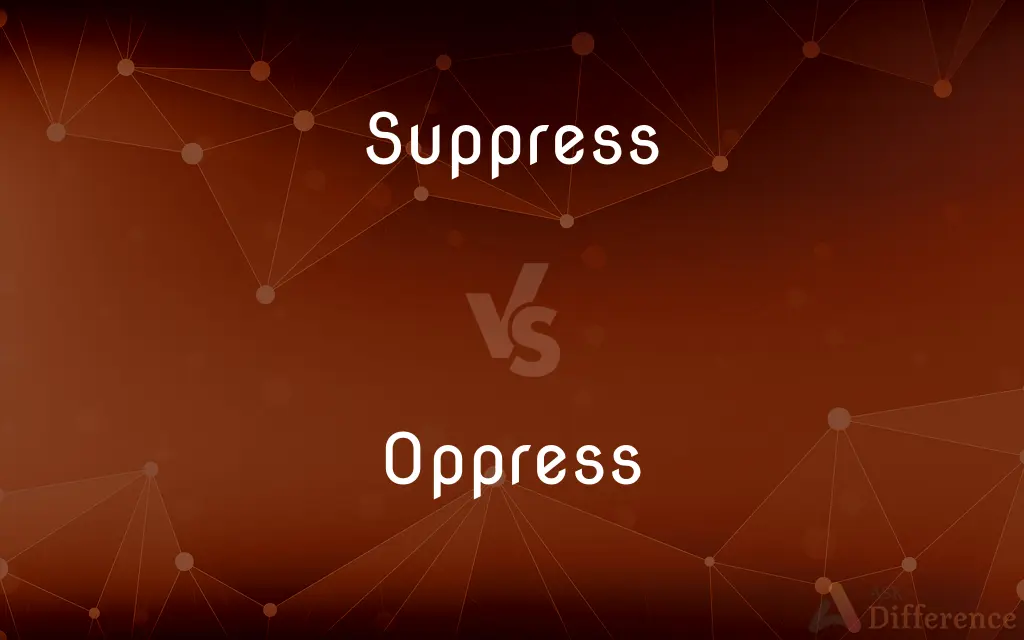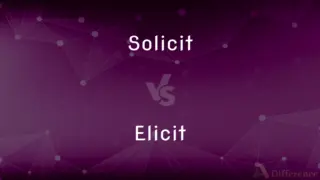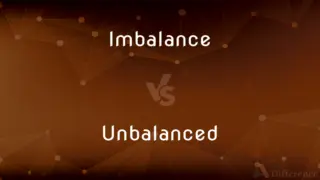Suppress vs. Oppress — What's the Difference?
By Urooj Arif & Fiza Rafique — Updated on March 11, 2024
Suppressing involves holding back, restraining, or stopping something from happening, can be used in various contexts. Oppressing involves exercising authority or power in a burdensome, cruel, or unjust manner, typically over a prolonged period.

Difference Between Suppress and Oppress
Table of Contents
ADVERTISEMENT
Key Differences
Suppression and oppression are both forms of control but differ significantly in their application and implications. Suppression involves stopping or inhibiting an action, emotion, or thought, often to maintain order or prevent undesirable outcomes. Oppression, on the other hand, is a systematic and pervasive exercise of power, where one group or individual exerts control over another in a harmful and unjust way. It often involves denying fundamental rights and freedoms, leading to long-term suffering and inequality.
While suppression might be a tactic used within the broader context of oppression, such as suppressing dissenting voices, it is not inherently unjust or prolonged. Oppression encompasses a wider range of unjust practices that maintain unequal power dynamics, often supported by institutional structures.
The intent and outcome differentiate the two: suppression aims to control or end a specific action or thought, possibly for immediate practical reasons, without an inherent moral judgment. In contrast, oppression involves a harmful, prolonged control that infringes on rights and dignity, with a clear moral implication of injustice.
Understanding the context is crucial when distinguishing between suppressing and oppressing. Suppression can be a neutral or even positive action in some contexts, such as suppressing harmful bacteria with antibiotics. However, oppression is inherently negative, implying a systematic denial of equity and rights that leads to long-standing social harm.
Comparison Chart
Definition
To hold back, restrain, or stop something from happening.
To exercise power in a burdensome, cruel, or unjust manner.
ADVERTISEMENT
Application
Can be applied to thoughts, emotions, actions, or movements.
Typically applied in social, political, or economic contexts against groups or individuals.
Duration
Often temporary or situational.
Prolonged and systematic.
Power Dynamics
Not necessarily associated with an imbalance of power.
Involves an imbalance of power, with one group dominating another.
Intent and Outcome
Aims to control or end a specific action or thought, without inherent moral judgment.
Involves a harmful control infringing on rights and dignity, with clear moral implications.
Compare with Definitions
Suppress
To stop something by force.
The government acted quickly to suppress the uprising.
Oppress
To keep someone in subservience and hardship.
The regime was known to oppress its critics and opponents.
Suppress
To hold back an expression or feeling.
She suppressed her anger during the meeting.
Oppress
To burden someone with cruel or unjust impositions.
Minority communities often feel oppressed by systemic inequalities.
Suppress
To inhibit the growth or development of something.
The medication is designed to suppress symptoms.
Oppress
To exercise authority in a harmful and unjust way.
The colonizers oppressed the indigenous population for centuries.
Suppress
To prevent information from being known.
The organization tried to suppress the report's findings.
Oppress
To dominate or control in a harsh or unjust manner.
The government's policies were seen as a way to oppress dissenting voices.
Suppress
To restrain from a natural or usual expression.
He had to suppress a cough during the concert.
Oppress
To cause to feel distressed, anxious, or uncomfortable.
The oppressive heat made it difficult to work outdoors.
Suppress
To put an end to forcibly; subdue
Suppress a rebellion. See Usage Note at repress.
Oppress
To keep down by severe and unjust use of force or authority
A people who were oppressed by tyranny.
Suppress
To curtail or prohibit the activities of
Suppress dissident groups.
Oppress
To cause to feel worried or depressed
"People were at a loss ... oppressed by the atmosphere of the dead man's room" (Ward Just).
Suppress
To keep from being revealed, published, or circulated
Suppress evidence.
Suppress a film.
Oppress
(Obsolete) To overwhelm or crush.
Suppress
To deliberately exclude (unacceptable desires or thoughts) from the mind.
Oppress
(transitive) To keep down by unjust force.
The rural poor were oppressed by the land-owners.
Suppress
To inhibit the expression of
Suppress anger.
Suppress a smile.
Oppress
(transitive) To make sad or gloomy.
We were oppressed by the constant grey skies.
Suppress
To restrain the growth, activity, or release of
Suppress a virus.
Suppress a hemorrhage.
Oppress
Physically to press down on (someone) with harmful effects; to smother, crush.
Suppress
To inhibit the expression of (a gene)
Suppress a mutation.
Oppress
To impose excessive burdens upon; to overload; hence, to treat with unjust rigor or with cruelty.
For thee, oppressèd king, am I cast down.
Behold the kings of the earth; how they oppressThy chosen!
Suppress
To put an end to, especially with force, to crush, do away with; to prohibit, subdue.
Political dissent was brutally suppressed.
Oppress
To ravish; to violate.
Suppress
To restrain or repress, such as laughter or an expression.
I struggled to suppress my smile.
Oppress
To put down; to crush out; to suppress.
The mutiny he there hastes to oppress.
Suppress
(psychiatry) To exclude undesirable thoughts from one's mind.
He unconsciously suppressed his memories of abuse.
Oppress
To produce a sensation of weight in (some part of the body); as, my lungs are oppressed by the damp air; excess of food oppresses the stomach.
Suppress
To prevent publication.
The government suppressed the findings of their research about the true state of the economy.
Oppress
Come down on or keep down by unjust use of one's authority;
The government oppresses political activists
Suppress
To stop a flow or stream.
The rescue team managed to suppress the flow of oil by blasting the drilling hole.
Hot blackcurrant juice mixed with honey may suppress cough.
Oppress
Cause to suffer;
Jews were persecuted in the former Soviet Union
Suppress
To forbid the use of evidence at trial because it is improper or was improperly obtained.
Suppress
(electronics) To reduce unwanted frequencies in a signal.
Suppress
(military) To stop or prevent the enemy from executing unwanted activities like firing, regrouping, observation or others.
Suppress
(obsolete) To hold in place, to keep low.
Suppress
To overpower and crush; to subdue; to put down; to quell.
Every rebellion, when it is suppressed, doth make the subject weaker, and the prince stronger.
Suppress
To keep in; to restrain from utterance or vent; as, to suppress the voice; to suppress a smile.
Suppress
To retain without disclosure; to conceal; not to reveal; to prevent publication of; as, to suppress evidence; to suppress a pamphlet; to suppress the truth.
She suppresses the name, and this keeps him in a pleasing suspense.
Suppress
To stop; to restrain; to arrest the discharges of; as, to suppress a diarrhea, or a hemorrhage.
Suppress
To put down by force or authority;
Suppress a nascent uprising
Stamp down on littering
Conquer one's desires
Suppress
Come down on or keep down by unjust use of one's authority;
The government oppresses political activists
Suppress
Control and refrain from showing; of emotions
Suppress
Keep under control; keep in check;
Suppress a smile
Keep your temper
Keep your cool
Suppress
Put out of one's consciousness
Common Curiosities
Can an individual oppress another individual?
While oppression typically involves systemic power imbalances affecting groups, individuals can also exert oppressive behaviors in interpersonal relationships, reflecting broader societal dynamics.
Can suppression ever be positive?
Yes, in some contexts, suppression can be positive or necessary, such as suppressing harmful bacteria or controlling dangerous behaviors.
Is suppression always intentional?
Suppression can be both intentional, such as deliberately holding back information, and unintentional, as in unconsciously suppressing emotions.
Is all oppression physical?
No, oppression can be physical, psychological, economic, or social, often involving systemic inequalities and injustices.
What are examples of oppressive systems?
Examples include racial segregation, gender discrimination, authoritarian regimes, and economic systems that perpetuate inequality.
How is oppression addressed or countered?
Addressing oppression often involves systemic changes, advocacy, legal reforms, and raising awareness to challenge and dismantle unjust power structures.
Can suppression lead to oppression?
Yes, suppression can be a tactic within broader oppressive systems, especially when it systematically targets dissenting voices or minority groups.
Can someone be unaware they are being oppressed?
Yes, systemic oppression can be normalized within societies, making it difficult for individuals to recognize the injustices they face.
What is the role of international organizations in addressing oppression?
International organizations can advocate for human rights, provide support to oppressed populations, and hold oppressive regimes accountable.
Are there psychological effects of suppression?
Yes, suppressing emotions or thoughts can lead to stress, anxiety, and other psychological issues, highlighting the importance of expression and coping mechanisms.
How does suppression differ from censorship?
Suppression involves holding back or stopping something, which can include censorship, but censorship specifically refers to the suppression of speech, communication, or other information.
Can legal systems be oppressive?
Yes, legal systems can perpetuate oppression through biased laws, unequal enforcement, and barriers to justice for marginalized communities.
What role does education play in combating oppression?
Education can raise awareness, empower marginalized groups, and foster critical thinking to challenge and change oppressive structures.
How can individuals resist suppression and oppression?
Individuals can resist through activism, solidarity, educating themselves and others, and supporting movements that seek to dismantle oppressive systems.
How does oppression affect community development?
Oppression can hinder development by limiting opportunities, resources, and freedoms, leading to cycles of poverty and inequality.
Share Your Discovery

Previous Comparison
Solicit vs. Elicit
Next Comparison
Imbalance vs. UnbalancedAuthor Spotlight
Written by
Urooj ArifUrooj is a skilled content writer at Ask Difference, known for her exceptional ability to simplify complex topics into engaging and informative content. With a passion for research and a flair for clear, concise writing, she consistently delivers articles that resonate with our diverse audience.
Co-written by
Fiza RafiqueFiza Rafique is a skilled content writer at AskDifference.com, where she meticulously refines and enhances written pieces. Drawing from her vast editorial expertise, Fiza ensures clarity, accuracy, and precision in every article. Passionate about language, she continually seeks to elevate the quality of content for readers worldwide.













































